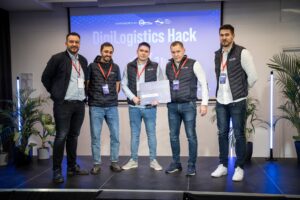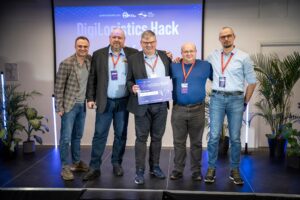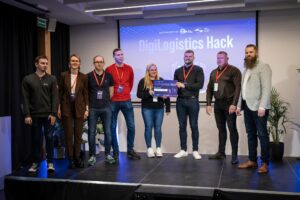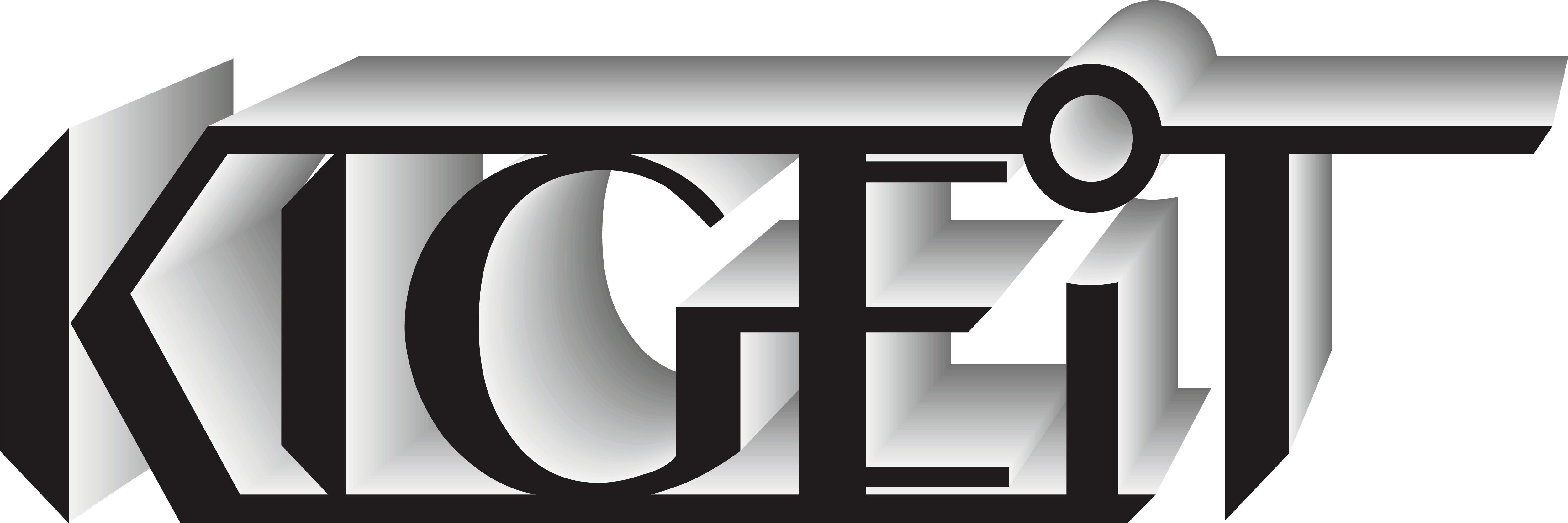W dniach 24-26 marca 2023 roku odbył się w Wilnie Międzynarodowy Hackathon DigiLogistcs Hack poświęcony problemom związanym z wprowadzaniem elektronicznych dokumentów w transporcie. Hackathon jest elementem wspólnego projektu Estonii, Finlandii, Litwy, Łotwy i Polski, którego partnerem ze strony Polski jest Krajowa Izba Gospodarcza Elektroniki i Telekomunikacji (KIGEiT). Projekt finansowany jest przez the Northern Dimension Partnership for Transport and Logistics (NDPTL). Poniżej relacja z wydarzenia.
![]() DIGILOGISTICS HACKATHON:
DIGILOGISTICS HACKATHON:
WHO IS TAKING THE LEADERSHIP TOWARDS PAPERLESS TRANSPORT
Prepared and sponsored by the Project: “eCMR in ND region”, Project ID: NDPTL Project 001-2021
“Out of every one hundred men, ten shouldn’t even be there, eighty are just targets, nine are the real fighters, and we are lucky to have them” – famous Heraclitus quote depicts the true situation of the International DigiLogistics Hack – event, where th ose game changers in transport and logistics sector gathered in Vilnius to face the challenges of digital transformation and influence the future route for development.
12 teams from start-up and transport logistic companies supported by 16 mentors from Finland, Estonia, and Lithuania worked for the whole weekend to deliver problem solutions on the following challenges:
- eCMR and eFTI interoperability focused on the use of meta data for transport and logistics processes.
- Cross border customs digital solutions aimed to extend eFTI requirements.
- Intermodal digital solutions for intermodal shipments and logistics.
- CO2 reduction calculation methodology, which means less empty millage and paper documents upgrading logistics processes more efficient and faster.
It is already a known fact that using QR codes on freight transportation, border crossing and unified information system would decrease the usage of paper documents and time for procedures, thus equally the work hours. Automation and AI would increase the operational efficiency and decrease the possibility of mistakes. The eFTI (electronic Freight Transport Information) Regulation turns into force already in 2025 and EU member countries and companies working in the sector of transport and logistics have to get ready already today. That might be the reason why the majority of the teams have chosen the challenges related to the upcoming eFTI requirements. And any other solutions of named challenges above are based on digital tools that always come with the output of the decrease of CO2 emissions.
This aim to meet eFTI requirements is one of the strategic issues for the „Baltic line“, which has nominated a team of professionals to work in the Hackathon and won the first place. „The digital transformation is important for us therefore, we have upgraded our data exchange programme according to the eFTI requirements which are already public. It is important to show that the freight transportation without paper is possible already now and with the new datasets these processes will be even more easier”, – says Mr. Robertas Gaižys, “Baltic line” Head of Freight transportation Department.
The second place was dedicated to „LTG Cargo“ team with the solutions for the eFTI extension cross borders. Its representative Mr. Darius Pranka also mentioned the importance of eFTI impact to their existing digital solutions: „We have created the solution from scratch, the idea of the cross border application that we have presented, was initiated during the Hackathon“. The team of „LTG Cargo“ created a prototype for document exchange, which would be based on cloud solutions and would contribute to time saving and process efficiency.
The third place was shared by „CargoGO“ and „Cargo Sign“. The „Cargo Sign“ team proposed a CMR based digital programme, which could operate as a stand-alone app or be applied to already existing system which would contribute to decrease the use of paper documents, increase security and traceability as well as real time data exchange between different systems. „CargoGo“ team highlighted the special formulars and calculation methodology, which they succeeded to integrate into the system meant to choose the route not only based on time and costs but also on CO2 emissions. The decrease of CO2 emissions is achieved by route optimization, digitalization and telematics as well as eco driving gamification methodologies for drivers. “CargoGo” believes that this solution will increase their competitiveness and is the game changer in the freight transportation market.
The International Hackathon DigiLogistics Hack initiative was derived by the eCMR Project financed by Northern Dimension Partnership for Transport and Logistics (NDPTL) Fund. The event was also sponsored by “CargoGo” and “LTG Cargo”. The main organiser was Transport Innovation Association who is responsible for information dissemination of the NDPTL eCMR Project. The Hackathon was hosted by Tech Zity in Vilnius at the premises of Vilnius TechPark on the 24-26th March 2023.
The Hackathon is in line with the aims of the EU Strategy for the Baltic Sea Region and is supported by multiple organizations of the regions such as: CaaS Nordic, LIKTA, KiGeiT, InfoBalt and others. The success of the event implies that it will be repeated further in other Baltic Sea Region countries with the aim to align knowledge and experience on the way towards paperless and green freight transportation.
The pitches of the teams and the final event of the Hackathon can be seen at: (249) Hakatonas – YouTube



